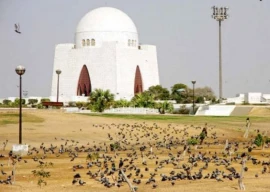
A top level dialogue between Pakistan and the United States is under way to hammer out a negotiated settlement on the Raymond Davis issue.
The talks were made public on Saturday after the US ambassador in Pakistan, Cameron Munter, called on President Asif Ali Zardari and delivered an important message from Washington, a source said requesting anonymity.
After the meeting, spokesperson for the president Farhatullah Babar issued a brief and vague statement, which said that various bilateral issues were discussed between the two sides.
An article published in The Washington Post on Saturday by President Zardari on the Davis issue also came under discussion, sources said.
A veteran diplomat said that a marked improvement in bilateral ties between Pakistan and the United States “will be visible over the next couple of weeks” when US special envoy on Afghanistan and Pakistan, Mark Grossman, will hold talks with top civilian and military leadership of the country.
The ties, which soured rapidly after the arrest of a CIA contractor, Raymond Davis, in Lahore on Jan 27, “are returning to normalcy”, the former diplomat told The Express Tribune. “The process to return the Washington-Islamabad diplomatic affairs to normalcy is under way,” he said requesting anonymity.
However, at no point in time did the relations hit a point of no-return despite a heated war of words.
In this context, he cited two important meetings between top Pakistani-US military leaders in Muscat and Rawalpindi over the past week.
The February 23 meeting in Muscat between Gen Ashfaq Parvez Kayani and US Chairman of the Joint Chiefs of Staff Admiral US Central Command chief General James Mattis, chief of the Special Operations Command Admiral Eric Olson and the Commander of Nato forces in Afghanistan, General David Petraeus.
Although US commanders consult frequently with General Kayani, this was only the third time they gathered in this manner since August 2008, said an ISPR press release to signify the meeting.
Referring to CIA-ISI ties in the context of Raymond Davis episode, the diplomat noted the post meeting statement by the ISPR: “The two sides also discussed the need for greater infrastructure development, cross-border communication between Pakistan and Afghanistan and information sharing to defeat terrorists.”
The second meeting between Gen Kayani and top US commanders occurred on March 3 at the GHQ when the Tripartite Commission, composed of senior military representatives from Afghanistan, Pakistan and coalition forces in Afghanistan, held its 33rd meeting in Rawalpindi, including General David H Petreaus, Commander of the International Security Assistance Force (Isaf) and General Sher Muhammad Karimi, Chief of General Staff of Afghan National Army. The forum also discussed various measures to further improve the coordination.
To substantiate his optimism, the former diplomat said that Grossman’s first interaction with President Zardari and Gen Kayani is primarily scheduled for talks on the Afghan issue but it would not remain confined to just one single subject.
“There is no doubt that the talks will play a key role in put the ties back on the right track,” he added.
The US envoy is faced with an uphill task in Afghanistan as the US plans the withdrawal of its troops from Afghanistan this summer.
Grossman has already been to London, Jeddah, Kabul, Islamabad and Brussels to promote a “political reconciliation with the Taliban”.
“There appeared to a greater realisation between the civil and military leadership of the both countries that the Davis’ factor should not be allowed to take their (bilateral) relations, particularly war on terror, a hostage,” he said.
The former diplomat cited three major developments which indicated leniency on part of Pakistan: (a) Pakistan refrained from prosecuting Raymond Davis on espionage charges despite the fact that Davis was put on trial for the Lahore murders (b) Pakistan is no longer demanding the custody of the three US nationals who are still hiding in the US consulate in Lahore after crushing to death another Pakistani citizen (c) Spying charges were not pressed against another US national who was arrested in Peshawar despite having been found to be involved in questionable activities.
However , the arrest of the US citizen in Peshawar sent a loud and clear message to the CIA that more of its “spies” could be arrested in the future, the former diplomat opined.
On the part of the Americans, he said, a long list of its “diplomats” was made public by the state minister for foreign affairs after the list was handed over by the US embassy last week.
However, he warned that it would be a “mistake to read this display as an indication that the trust issues have been resolved between the two intelligence agencies”.
“But it is also significant to note that the CIA spokesman George Little said any problems between the two agencies will be sorted out.”
Published in The Express Tribune, March 6th, 2011.
1731570357-0/elon-musk-(1)1731570357-0-405x300.webp)
-(1)1717678110-0/Kendrick-(1)-(1)1717678110-0-165x106.webp)






1732428532-0/BeFunk_§_]__-(43)1732428532-0.jpg)








COMMENTS (18)
Comments are moderated and generally will be posted if they are on-topic and not abusive.
For more information, please see our Comments FAQ